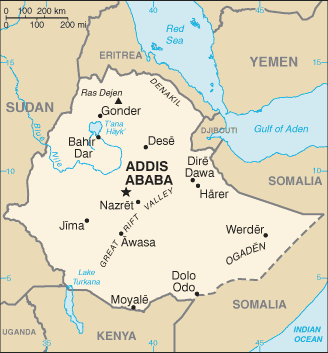Moving Gishta into the Global Economy
HOME | ABOUT ETHIOPIA | ABOUT GISHTA | GISHTA GOING GLOBAL | CONCLUSION | REFERENCES

Ethiopia’s Economy
According to the World Factbook, Ethiopia’s economy is based on agriculture. As mentioned in the introduction, agriculture provides for 60% of the country’s exports. The agricultural sector also provides jobs for 80% of the work force. 38.7% of the population lives below the poverty line, a fact we are hoping to change by the implementation of the gishta website. The most prominent export commodities are coffee, qat, oilseed, leather products, and live animals. The United States is currently not one of Ethiopia’s main trading partners, but we believe that gishta will find a market in the US [6].
Ethiopian Trade and Restrictions
The Ethiopian government has been attempting to ease its country’s breakthrough into the global economy by following the IMF’s structural adjustment policy since 1992 [8]. To do this, they have implemented a number of reform programs that have helped to promote exports. Among these are a reform which has made the private sector the “dominant player” in exports, an abolition of all export taxes and subsidies excluding those on coffee, and the reduction of the percentage of profits from exports that have to be given to the National Bank of Ethiopia [7]. The government has also deregulated domestic prices, liberalized foreign trade, and privatized a lot of the public enterprises [10].
Ethiopian farmers wishing to import their gishta into the United States will need to take into consideration US regulations on importing fruit, mainly the Agricultural Agreement Act of 1937. In this agreement, it is stated that whenever the Secretary of Agriculture issues any regulations under domestic marketing orders for specific commodities, similar regulations on imports must be issued. The regulations would apply only when the domestic regulations are in effect, and so it is important to know which commodities are currently being regulated. Aside from this, the farmers would be made to pay import taxes and duties on what they send into the country [9].